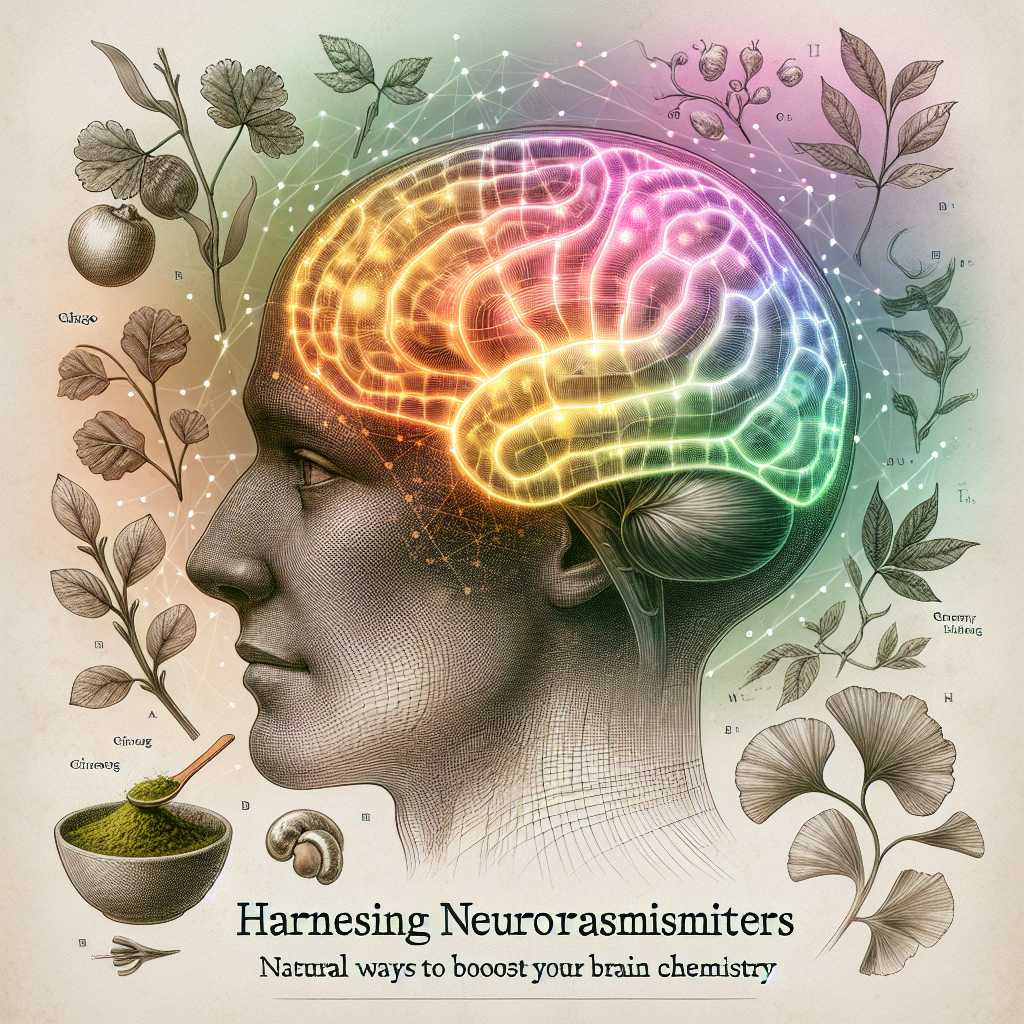
Introduction
In an era where mental clarity and emotional well-being are pivotal for success, the quest to optimize brain chemistry has never been more urgent. Harnessing Neurotransmitters: Natural Ways to Boost Your Brain Chemistry isn’t just a catchphrase; it’s a lifestyle shift that could unlock unparalleled cognitive potential. Imagine transforming your mood, focus, and overall mental agility simply through natural interventions! The intricate interplay of neurotransmitters—chemical messengers that transmit signals within the brain—forms the foundation of our mental states and emotional responses.
Are you ready to explore the natural pathways to enhance your brain chemistry? Let’s dive into the world of neurotransmitters and unveil practical strategies to harness their potential.
Understanding Neurotransmitters
Neurotransmitters are essential players in the arena of brain chemistry. These chemicals enable communication between neurons, influencing everything from mood and cognition to motor control and digestion. Here are some of the most impactful neurotransmitters:
- Dopamine: The "feel-good" neurotransmitter linked with pleasure and reward.
- Serotonin: Often regarded as a mood stabilizer, it helps regulate anxiety, happiness, and mood.
- Norepinephrine: Crucial for focus, this neurotransmitter is responsible for the body’s fight-or-flight response.
- Acetylcholine: Vital for learning and memory.
- GABA (Gamma-Aminobutyric Acid): The primary inhibitory neurotransmitter, which helps calm the nervous system.
By understanding these neurotransmitters, we can better appreciate their role in our motivational states and mental health.
Natural Ways to Boost Neurotransmitter Levels
Diet: Fuel Your Brain
One of the most effective methods for harnessing neurotransmitters is through nutrition. Consuming foods rich in amino acids, vitamins, and minerals can directly influence neurotransmitter synthesis.
Key Nutrients to Consider:
| Nutrient | Role | Sources |
|---|---|---|
| Tryptophan | Precursor to serotonin; boosts mood | Turkey, nuts, seeds, cheese |
| Tyrosine | Precursor to dopamine; enhances mental performance | Chicken, fish, dairy, soy products, bananas |
| Omega-3 Fatty Acids | Supports brain health; crucial for neurotransmitter function | Fatty fish, flaxseeds, walnuts, chia seeds |
| Magnesium | Regulates GABA; aids in relaxation and sleep | Leafy greens, nuts, seeds, whole grains |
Integrating these nutrients into your diet is a simple yet powerful way to boost your brain chemistry.
Exercise: Move Your Mind
Physical activity is not only beneficial for your body; it also plays a crucial role in harnessing neurotransmitters. When you exercise, your brain releases endorphins, dopamine, and serotonin.
The Science Behind Exercise and Neurotransmitters
A 2019 study published in the Journal of Psychiatry highlighted the relationship between exercise and increased serotonin levels. Participants who engaged in regular aerobic exercise showed significant mood improvements and higher serotonin levels compared to sedentary individuals.
Case Study: The Running Effect
A group of individuals participated in a 12-week running program. Those who maintained their exercise regimen reported enhanced mood and cognitive function. The increase in serotonin levels during and after exercise illustrated how physical activity can be a natural way to boost brain chemistry.
Mindfulness and Meditation: Cultivating Calm
Meditation and mindfulness practices have gained popularity for their ability to reduce stress and improve mental clarity. Studies show that these practices can significantly elevate serotonin levels while lowering cortisol, the stress hormone.
Benefits of Meditation:
- Increased Dopamine: Regular meditation practices can raise dopamine levels, fostering a sense of reward and positivity.
- Improved Focus: Mindfulness can enhance norepinephrine, sharpening focus and response times.
Case Study: Mindfulness in Action
A community meditation group tracked participants over six weeks. Those who practiced mindfulness reported reduced anxiety and enhanced feelings of happiness, corroborating findings that harnessing neurotransmitters through meditation leads to improved brain chemistry.
Quality Sleep: Recharge Your Brain
Sleep is essential for regulating neurotransmitter levels. Inadequate sleep can disrupt serotonin and dopamine production, leading to mood imbalances and cognitive decline.
Tips for Quality Sleep:
- Maintain a consistent sleep schedule.
- Create a restful environment (cool, dark, and quiet).
- Limit screen time before bed to support melatonin production.
Those who prioritize sleep often report higher energy levels and better mood regulation, illustrating how this fundamental aspect of our lives can profoundly affect our brain chemistry.
Social Connections: Build Supportive Relationships
Social interactions are vital for emotional well-being and have been shown to influence neurotransmitter levels positively.
The Power of Connections:
Engaging in meaningful relationships can increase dopamine and serotonin levels, promoting feelings of happiness and satisfaction.
Case Study: Social Connections and Mental Health
In a longitudinal study, participants with strong social support reported lower levels of depression and anxiety. The presence of friends and family not only fortified community bonds but also enhanced individual brain chemistry through elevated neurotransmitter levels.
Conclusion
As we’ve explored, harnessing neurotransmitters through natural means is an exciting and empowering journey. By mastering diet, exercise, mindfulness, sleep, and social connections, you can significantly influence your brain chemistry and enhance your mental well-being. The intricacies of neurotransmitters serve as a powerful reminder of how interconnected our lifestyle choices are with our cognitive and emotional health.
Take the first step today towards a balanced brain. Engage with the practices we’ve discussed and unlock the potential that lies within you—your brain chemistry holds the key to your best self!
FAQs
1. What are neurotransmitters, and why are they important?
Neurotransmitters are chemical messengers that transmit signals in the brain. They play a vital role in regulating mood, emotions, cognition, and various physiological processes.
2. Can diet really affect neurotransmitter levels?
Absolutely! Certain nutrients are precursors for neurotransmitter production. Consuming a balanced diet rich in the right amino acids, vitamins, and minerals can enhance brain chemistry.
3. How much exercise do I need to boost neurotransmitter levels?
Aim for at least 150 minutes of moderate aerobic exercise per week to see significant improvements in mood and cognitive function.
4. Is meditation effective for everyone?
While most people can benefit from meditation and mindfulness practices, individual experiences may vary. Consistency is key to seeing long-term benefits.
5. How can I improve my social connections for better mental health?
Prioritize spending time with friends and family, join community groups, or engage in hobbies that allow you to connect with others. Building strong relationships can elevate your mental state.
Feel empowered to take charge of your brain chemistry through these natural methods. The journey of harnessing neurotransmitters: natural ways to boost your brain chemistry is not just about science; it’s about transforming your life!















